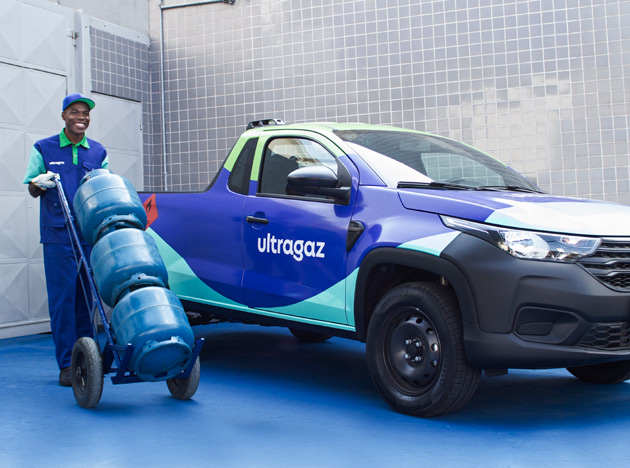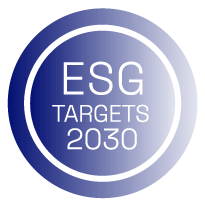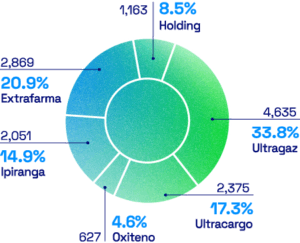Value Chain


 Performance
Performance Social and relationship capital
Social and relationship capitalIntellectual capital
 Human capital
Human capital
alignment to the SDGs

![]()
The scale and reach of the Ultra Group’s value chain are what enables it to offer essential services to people and companies in all regions of Brazil. This strategic character of the value chain has always been valued by the Group, which remains committed to ethical and transparent business practices and to the generation of value for its business partners.
In view of its long history in its industrial sectors and the good reputation it enjoys in society, the Ultra Group understands that it has a responsibility to play a leading role in promoting sustainable practices in its value chain. In particular it must provide support to its extensive network of business partners to enable them to incorporate sustainable business practices and to develop management models that combine good financial results with good social and environmental practices.
In 2021, this perspective gained traction. Based on the discussions in the value chain work-group regarding its suppliers and resellers, it was possible to define the Group’s priorities in fostering the development of its value chain.
Supplier Reputation Research
One of the elements of the Ethics and Compliance Program is to carry out research on the reputations of prospective suppliers of goods or services, resellers and franchisees, prior to signing contracts. On the basis of this research, it is possible to verify whether prospective partners adhere or not to the Ultra Group’s principles in relation to ethics and integrity. This process contributes to minimizing the Group’s reputation and financial risks in situations of co-responsibility. Furthermore, the process ensures that the Group’s partners in the value chain are aware of the high level of importance that the Group gives to compliance.
During the year, more than 12 thousand reputation research studies were carried out, compared to 15 thousand in 2020.
One of the aspects of the reputation research aims to ensure that prospective suppliers have not been involved in situations of child labor or forced labor. The research checks investigations, lawsuits, complaints in the press and the government register of employers known to have subjected workers to forced labor conditions. In such cases, the Compliance area rigorously evaluates the results of the reputation research and, depending on the facts presented, the Group may decide not to enter into the contract.
It is also worth noting that the supplier contracts contain clauses that prohibit child labor and forced labor and encourage partners to support initiatives and campaigns to combat these practices.
There are also additional documents and procedures. In Ultragaz, all critical suppliers (responsible for the supply of materials or services capable of affecting the availability and quality of the company’s products) must sign a Term of Commitment to Responsible Action, which includes the prohibition of child and forced labor and the adherence to certain social, environmental and ethical topics.
Ultracargo demonstrates its commitment to defending human rights in its value chain by requiring its registered suppliers to adhere to the requirements of SA 8000, labor relations and other international standards to ensure that its partners are not involved in situations of child labor or forced labor. The company’s partners must also be in compliance with the Ultra Group’s Code of Ethics and Health, Safety, Environment and Quality standards and procedures. On-site audits are carried out by the Purchasing Area whenever any social or environmental risk is identified.
Oxiteno also has clauses in its Responsible Sourcing Policy that expressly prohibit relations with suppliers linked to child or forced labor. Ipiranga has determined that all suppliers must comply with the guidelines in its Supplier Policy, which contains a sustainability booklet with topics related to the protection of human rights.
In 2021, no risks were identified related to child or forced labor or to the exposure of young people to dangerous activities either in the operations of the Group or its suppliers. ![]()
Social and Environmental Assessment of Supplier

The Holding and the businesses independently manage their respective value chains, based on the Group’s general guidelines on compliance. In addition to the reputation surveys, which are carried out for all prospective suppliers, in some businesses suppliers are assessed more comprehensively in relation to their performance in social and environmental aspects.
In Ultragaz, the analysis of critical suppliers included the verification of checks as to whether the companies had certifications and other mandatory documents, supported initiatives for environmental preservation and social responsibility, and prioritized the health and safety of employees. Audits were carried out prior to signing contracts and also during the term of the contract. Due to the Covid-19 pandemic, in 2021, audits were carried out remotely and a process of self-assessment by the partners themselves was instituted. During the year, after a rigorous evaluation process, the company admitted six new companies into its critical group of suppliers.
Ultragaz also encouraged some of its critical suppliers to respond to the Carbon Disclosure Project (CDP) questionnaires on climate change and water resources. In 2021, 95% of invited suppliers responded to the questionnaires. Another initiative during the year was the structuring of a Supplier ESG Engagement Program, which will be implemented in 2022.
Within the scope of its Supplier Approval Program, implemented at the end of 2020 for critical suppliers, Ultracargo verified the social and environmental documentation of prospective partners and required them to complete a questionnaire on health, safety and environmental issues. In 2021, of the 565 new registered suppliers, 47 (8.3%) were classified as critical and were subjected to a social and environmental assessment.
In its Supplier Relationship Program, Oxiteno encourages partners to respond to the EcoVadis questionnaire, which includes topics related to labor practices, human rights, ethics, sustainable procurement and the environment. The score obtained in the questionnaire enables the company to prioritize the selection of the highest scoring candidates. Based on the results of the questionnaire, Oxiteno also provided support to suppliers in the structuring of improvement plans.
For the indirect suppliers, companies further down its value chain, Ipiranga carried out due diligence using automated tools. Suppliers in the transportation sector were audited before the contract was signed and then annually.

-
GROUP AMBITION
Influence, encourage and monitor the adoption of best ESG practices in the value chains of all the businesses.

-
100% of critical suppliers with excellent ESG practices
-
100% of selected resellers with ESG practices
MORE THAN
12 THOUSAND
REPUTATION
SURVEYS
CARRIED OUT
IN 2021.
Relations with Resellers
In 2021, Ultragaz intensified its interactions with its reseller network through its app called Meu Aplicativo Parceiro (MAP) (My Partner App). This app brought together all of its contents that support the financial and operational management of the reseller, dissemination of marketing materials and training courses. For the resellers’ employees, there is another app (called AmigU), through which employees have access to campaigns that provide incentives for higher performance, important events and training courses, among other features.
To encourage the continuous development of its resellers, Ultragaz has established a Reseller Excellence Program, called Desafio Lapidar, which rewards partners as they progress in performance and quality of services. In 2021, the company structured a new training course on sustainability, which will be made available to resellers in 2022.
In Ipiranga, in 2021, a new department was created to manage the different stages of the development of the relationships with the reseller base. Throughout the year, the company organized the Ipiranga Top program, which encourages the adoption of best management practices and recognizes the most engaged resellers. The company also created the communication channel (via WhatsApp) called Fica Ligado (Stay tuned), which enables the rapid dissemination of important information in Ipiranga’s network and sales teams.
The company also maintains a specific strategy for the employees in the Ipiranga service stations (known as VIPs), including a series of training courses and awards. More than 40 thousand Ipiranga VIPs and resellers participated in training courses at the company’s Retail School, totaling more than 300 thousand hours of training.
Ipiranga’s concern for best safety and environmental practices also underpins its relations with customers in the business market segment and with its network of resellers and franchisees. One of the initiatives reflecting this concern is the Posto Gestão+ web-page, hosted on Ipiranga’s network portal, which makes manuals, videos and booklets on safety and the environment available to resellers.
ESG Dashboard
76 thousand
INDIRECT JOBS GENERATED IN THE NETWORK OF RESELLERS AND FRANCHISEES (ULTRAGAZ AND IPIRANGA)
Supply Chain

